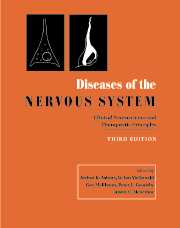Book contents
- Frontmatter
- Dedication
- Contents
- List of contributors
- Editor's preface
- PART I INTRODUCTION AND GENERAL PRINCIPLES
- PART II DISORDERS OF HIGHER FUNCTION
- 13 Congenital disorders of cerebral cortical development
- 14 The aging brain: morphology, imaging and function
- 15 Neurodegenerative diseases
- 16 Aging and dementia: principles, evaluation and diagnosis
- 17 Alzheimer's Disease
- 18 Dementia with Lewy bodies
- 19 Frontotemporal dementia
- 20 Consciousness and its disorders
- 21 Mechanisms of memory and amnestic syndromes
- 22 Acquired disorders of language
- 23 Neglect
- 24 Brain death
- 25 Disorders of mood
- 26 Schizophrenia
- 27 Obsessive–compulsive disorder
- 28 Autism and autistic spectrum disorders
- 29 Attention deficit hyperactivity disorder: spectrum and mechanisms
- 30 The neurobiology of drug addition
- PART III DISORDERS OF MOTOR CONTROL
- PART IV DISORDERS OF THE SPECIAL SENSES
- PART V DISORDERS OF SPINE AND SPINAL CORD
- PART VI DISORDERS OF BODY FUNCTION
- PART VII HEADACHE AND PAIN
- PART VIII NEUROMUSCULAR DISORDERS
- PART IX EPILEPSY
- PART X CEREBROVASCULAR DISORDERS
- PART XI NEOPLASTIC DISORDERS
- PART XII AUTOIMMUNE DISORDERS
- PART XIII DISORDERS OF MYELIN
- PART XIV INFECTIONS
- PART XV TRAUMA AND TOXIC DISORDERS
- PART XVI DEGENERATIVE DISORDERS
- PART XVII NEUROLOGICAL MANIFESTATIONS OF SYSTEMIC CONDITIONS
- Complete two-volume index
- Plate Section
23 - Neglect
from PART II - DISORDERS OF HIGHER FUNCTION
Published online by Cambridge University Press: 05 August 2016
- Frontmatter
- Dedication
- Contents
- List of contributors
- Editor's preface
- PART I INTRODUCTION AND GENERAL PRINCIPLES
- PART II DISORDERS OF HIGHER FUNCTION
- 13 Congenital disorders of cerebral cortical development
- 14 The aging brain: morphology, imaging and function
- 15 Neurodegenerative diseases
- 16 Aging and dementia: principles, evaluation and diagnosis
- 17 Alzheimer's Disease
- 18 Dementia with Lewy bodies
- 19 Frontotemporal dementia
- 20 Consciousness and its disorders
- 21 Mechanisms of memory and amnestic syndromes
- 22 Acquired disorders of language
- 23 Neglect
- 24 Brain death
- 25 Disorders of mood
- 26 Schizophrenia
- 27 Obsessive–compulsive disorder
- 28 Autism and autistic spectrum disorders
- 29 Attention deficit hyperactivity disorder: spectrum and mechanisms
- 30 The neurobiology of drug addition
- PART III DISORDERS OF MOTOR CONTROL
- PART IV DISORDERS OF THE SPECIAL SENSES
- PART V DISORDERS OF SPINE AND SPINAL CORD
- PART VI DISORDERS OF BODY FUNCTION
- PART VII HEADACHE AND PAIN
- PART VIII NEUROMUSCULAR DISORDERS
- PART IX EPILEPSY
- PART X CEREBROVASCULAR DISORDERS
- PART XI NEOPLASTIC DISORDERS
- PART XII AUTOIMMUNE DISORDERS
- PART XIII DISORDERS OF MYELIN
- PART XIV INFECTIONS
- PART XV TRAUMA AND TOXIC DISORDERS
- PART XVI DEGENERATIVE DISORDERS
- PART XVII NEUROLOGICAL MANIFESTATIONS OF SYSTEMIC CONDITIONS
- Complete two-volume index
- Plate Section
Summary
Apatient with the neglect syndrome fails to report, respond or orient to, novel or meaningful stimuli presented to the side opposite a brain lesion (Heilman, 1979). If this failure can be attributed to either sensory or motor defects, the patient is not considered to have neglect.
The two basic mechanisms that are thought to be responsible for the failure to report, respond, or orient are defects in the systems that mediate sensory attention or motor intention. Whereas attentional defects may be associated with unawareness, intentional disorders may cause a failure to respond despite stimulus awareness. Attention and intention defects may occur in two domains: spatial and personal. Patients with neglect can also have spatial memory defects. This defect can be for new information or old memories (representational defects). This chapter describes tests that may be used to assess patients and behaviourally define these disorders. This chapter also discusses the pathophysiology underlying these disorders and their treatment.
Behavioural testing for the components of neglect
Tests for inattention and extinction
The attentional aspects of the neglect syndrome are detected by observing abnormal responses to sensory stimuli. Stimuli should be given in at least three modalities, somatesthetic, visual, and auditory, but other stimuli, such as gustatory and olfactory, may be used. Examiners often request immediate responses, however, delaying the response and using distractor techniques may help amplify the symptoms.
When testing with somatesthetic stimuli, one may control the intensity of a tactile stimulus by using Von Frei's hairs. However, fingers or cotton applicators are more convenient. Other cutaneous stimuli, such as pins, may be used. For bedside auditory testing, we use sounds made by either rubbing the fingers together or snapping them. When possible, perimetric and tangent screen studies should be used for testing visual fields. However, for bedside testing the confrontational method may be used; the examiner's finger movement can be used as the stimulus. A modified Poppelreuter diagram or written sentences may also be used.
These somatesthetic, auditory and visual stimuli should be presented to the abnormal (contralateral) side and to the normal side of the body in random order. If the patient responds normally to unilateral stimulation, simultaneous bilateral stimulation may be used. Unilateral stimuli should be randomly interspersed with simultaneous bilateral stimuli.
- Type
- Chapter
- Information
- Diseases of the Nervous SystemClinical Neuroscience and Therapeutic Principles, pp. 331 - 347Publisher: Cambridge University PressPrint publication year: 2002

